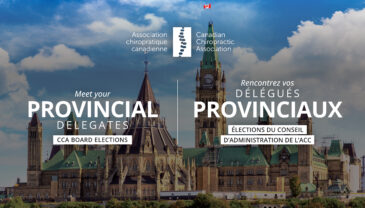

Introducing your candidates for the 2024 CCA Board Delegate election in Quebec.
Meet your colleagues who are applying for this important three-year term position and vote* for the member you feel will best represent you.
Voting begins on May 2, 2024 and closes on May 12, 2024 at 11:59 PM EDT.
*You will receive your personalized voting link on May 2 from Simply Voting, a secure third-party platform. All votes are encrypted to ensure anonymity and the CCA is not involved in tabulating results. If you do not receive your voting link, please email CCA Governance Officer, Sarah Perry at [email protected] for assistance.

Meet Dr. Camille Dallaire, Notre-Dame-de-L’lle-Perrot, Quebec
CV
My name is Camille Dallaire-Dahlager, and I practice as part of the team at Centre Chiropratique Des Sources, in Pointe-Claire, Quebec. I graduated from the Canadian Memorial Chiropractic College in 2019. I also hold a Bachelor of Science degree in Nutritional Sciences from McGill University. I have been on the Board of Governors of the Association Des Chiropraticiens du Quebec since spring of 2020, and have served on the Comite Formation Continue and on a committee that allowed for the completion and publication of the ACQ’s Acts and Services Manual.
In my personal life, my husband and I raise three wonderful daughters, aged 10, 3 and a half, and 2 years old. I am eternally grateful that I have the ability to raise my daughters, help patients in clinical practice, and make time to serve the chiropractic profession through advocacy and board work.
My experience on the board at the ACQ has allowed me to experience first hand the process of planning, implementing and reviewing the direction and performance of an association’s strat plan. This experience has also allowed me to see that open communication and collaboration, and setting aside individual interests for those of the entire profession are essential for the profession to move forward. An important skill that I have had the chance to improve with my experience with the ACQ is that of purposeful and accurate word-selection to communicate effectively, all while weighing the possible legal implications of the chosen vocabulary.
The “Support Our Members” objective is one that I think is of particular interest. I know that a lot has been done for French-speaking members in the later years, and there is an openness to increase resources for said-members, but I think more can and needs to be done. Members should have access to the resources that are offered by the CCA in both the official languages of Canada. This would allow for trench-speaking members to have full access to the same information that is currently accessible for the English-speaking members. Further, there are some cultural and linguistic differences that are important and have to be considered. For instance, the DEI training, although quite interesting in English, is not relevant or useful for members who work in trench-speaking communities. The DEI linguistic specifications are different in French, and as such we are left with a minority of members who received no benefit from the program. This is also true for any of the online courses or resources that are published in English only. Unfortunately, this may mean that there is a minority of members who feel that the national association is not working for, or serving them.
I believe the national association has a role to play in promoting these principles by providing members with the necessary resources to apply these principles in their practices and their communities. An important part of this is ensuring that access to resources in different languages be provided. DEI language is very different in French vs English vs Punjabi vs Spanish, and members may provide service in languages other than English. I also believe that the CCA has an important role in setting an example to which members can look up to, in regards to DEI practices.

Meet Dr. Marie-Eve Claveau, Notre-Dame-de-L’lle-Perrot, Quebec
CV
I’ve been a chiropractor since 2007; my degree is from UQTR. I have a 7-year-old daughter. What I love most about my practice is the multidisciplinary collaboration. My strength is my wide range of experience as a chiropractor. I’m empathetic, energetic, and I love to keep learning and growing. I’m a leader who’s not afraid to take on new challenges for a good cause.
My strength lies in my wide range of professional experience. I’ve worked in a multidisciplinary clinic, I’ve run my own clinic with physicians, massage therapists and several employees, and I’ve worked as a solo practitioner. I’ve also taught in the department of medical electroneurophysiology.
Strength our partnerships – because it is really important for me to integrate chiropractors into Canada’s healthcare system.
That the chiropractic profession be representative of the population in terms of diversity, equity and inclusion. This makes the profession more accessible and better understood by the entire population.










 Apr 30, 2024
Apr 30, 2024 

 416-585-7902
416-585-7902